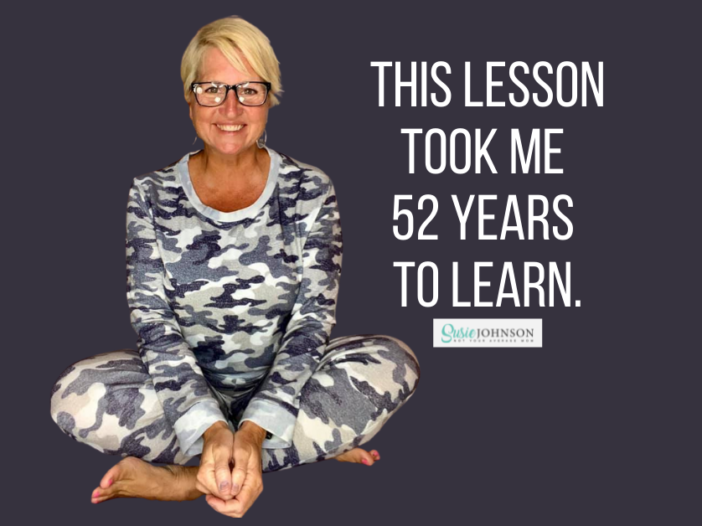
In January I joined a program at the Y called Lose to Win.
It’s a 12 week weight loss/healthy living program, and there are some competitive aspects to it as well.
You can “win” several different categories including total percentage of weight lost, most group fitness classes attended, most cardio minutes, most spin classes, most laps swum, etc.
I love a competition.
I love to compete and I also love to win.
I used to hate to lose.
But now I’m learning to appreciate the lessons that only come through failure and losing.
I participated in this program for the first time nine years ago.
I went overboard in the competition department.
At first my goal was to win one category.
It didn’t take long before my goal was to win more than one category.
And then eventually I wanted to be in the top 5 in every category.
I succeeded. Mostly.
I won the “most laps swum” and I came in second in overall weight loss and I was in the top 5 in every other category.
The problem was that in order to do this, I had to neglect other areas of my life.
I lost a lot of weight not so much from making changes I could maintain in the long run but by going to extremes in the exercise department.
I was working out at least two hours a day – usually closer to three hours.
It doesn’t take a rocket scientist to know that’s not sustainable.
That first time I participated in Lose to Win it ended in April, and I carried that unmanageable workout momentum through the summer. I competed in a couple of triathlons in June, July and August, and this ultimately led me to enter the NYC Marathon (my first marathon ever!) that November.
But even leading up to the marathon I had already started gaining a little weight back because while I was training for a marathon I wasn’t working out 2-3 hours a day.
It was only seven or eight pounds, but it was enough for my new, smaller-sized clothes to start feeling a little snug.
And then once the marathon was over, predictably, I stopped working out altogether.
I was burnt out.
I had also been seriously ignoring other areas of my life.
I went on a house organizing bender. I could justify not working out if I was doing something productive.
While my over-the-top efforts to win and/or place in the top 5 in every category were successful, in the long run, what did I have to show for it?
I hadn’t succeeded in establishing any new habits, and I had not been successful in finding a way to incorporate consistent self-care into most areas of my life.
This wasn’t a flaw in the LTW program but a flaw in my thinking.
Our biggest obstacles in life are backed by flawed thinking.
These habitual ways of thinking are the things we need to address if we want to experience true change.
The thought work needs to come first.
I didn’t need to go to extremes to experience successful change nine years ago.
I just needed to start smaller.
So much smaller.
Fast forward nine years to this past January when I joined Lose to Win again. This was on the heels of my first full year of being divorced.
My first year of divorce was all about survival.
It was the hardest year of my life to date, and I turned to food as a distraction from all the emotional discomfort and gained 25 pounds last year.
By this past January I was heavier than ever and ready to make some changes.
Lose to Win would be a great tool to help me start taking better care of myself.
This time around I decided I’d practice moderation and only try to win two categories and not worry about placing in the top 5 in the rest of them.
Clearly I still had some thought work to do in that department.
Just as Lose to Win was starting I got COVID.
I couldn’t swim for the first two weeks.
In week 3 when I was able to get back into the pool, I was behind first place by about 25,000 yards.
I did the math in my head.
If I swam 3-4000 yards 6 days a week, I could catch up in three or four weeks.
I swam over 14,000 yards the first week.
I felt great about how much I had swum, but I was also totally stressed out.
And exhausted.
And my shoulders were already starting to hurt.
I was trying to figure out how I was going to catch up, and the amount of swimming I had to do to make this happen was making the whole process really unenjoyable.
It was too hard.
I was trying to level up too quickly.
I was already getting burnt out. In fact, by week 5 I was totally dreading going to the pool.
I was doing it again.
I was going overboard.
There were two reasons why I wanted to join Lose to Win this year:
- I wanted (and needed) to lose weight.
- I wanted to start swimming consistently again.
The program would help me get my butt back in the pool and stop eating like an asshole.
But the way I was going about things, I was headed for burnout and complete cessation of everything. Again.
And burnout was definitely not my goal.
So I adjusted.
I don’t like to quit things. It’s not the person I want to be, and it’s not the example I want to set for my kids.
What I didn’t realize until recently is how I put myself in impossible situations.
Impulsivity is a challenge I’ve faced my whole life. I jump into things without thinking them through, and I often have unrealistic expectations regarding what I should be able to accomplish.
You know what they say about that…
Don’t should on yourself.
My expectations of myself are high because I know I have limitless potential.
We all have limitless potential!
But you can’t continue to discover what you are capable of if you completely run yourself into the ground.
Which is where I was headed just a couple weeks ago.
Swimming consistently is supposed to help me alleviate stress.
Not add to it.
I know.
DUH.
Sometimes you gotta take a step back to see what’s really going on.
Now that I’ve done that, I’ve adjusted my plan and my goals.
What is it that I ultimately want?
- I want to be consistently swimming 3-4 times per week.
- I want to be strength training 4 days/week.
- I want to lose 30 more pounds and sustain that. Forever.
Rather than focusing on the results, I need to focus on the process and go about that in a smart way.
By focusing on the result – swimming the most laps – I was doing way too much too soon.
Not only was I stressing about how I was going to catch up, I also went from 0 to 100 pretty much overnight. By my second week in the pool I was already feeling shoulder pain.
This was not good. If I injured myself I wouldn’t be able to swim at all.
And ultimately my goal this year wasn’t to win a swimming competition but to start swimming consistently.
So I’ve taken a step back, reassessed, and regrouped.
I’m not going to win any part of the LTW competitions.
Not on purpose, anyway.
Because I don’t need to prove anything to anyone else.
And I don’t need to win to prove anything to myself.
Winning a subcategory in a weight loss competition did not help me make lasting changes in the past.
And it’s not gonna help me right now.
What I need to focus on is the process and the things I need to do in order to get the results I want to have.
So how can I measure growth and progress?
Well, my ultimate goal is to swim 4-5 days/week which means approximately 20 days/month.
in 2021, I swam for a total of 5 days.
In the whole year.
And they were all in one week in May. I think it was the beginning of the summer and I decided I was going to start swimming again. But I only lasted for a week.
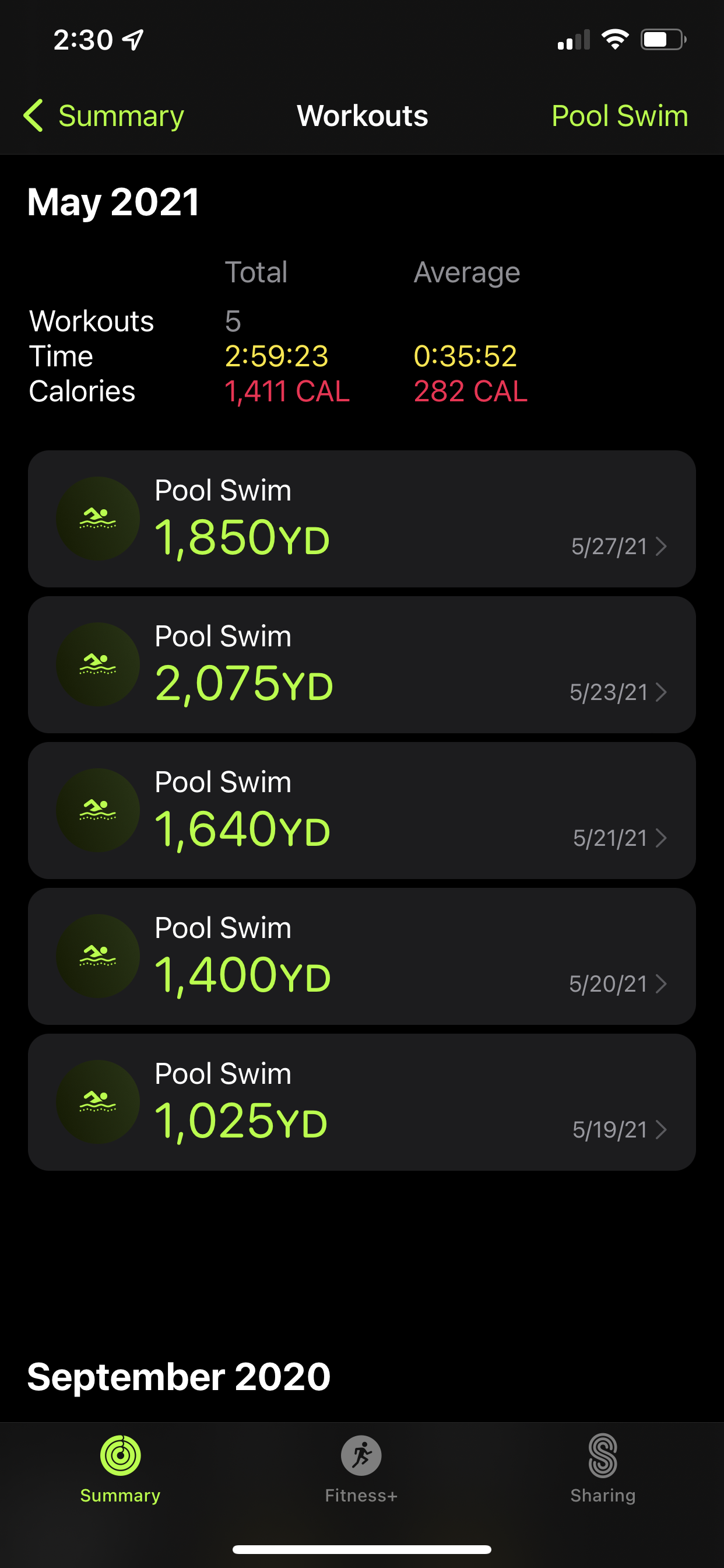
So that’s my baseline.
I swam 5 times in 2021.
This is what we call a neutral circumstance in E-School.
It doesn’t mean anything about my value as a human being. It’s not a reflection of what I’m worth.
It’s neither good nor bad.
It just is.
In January 2022, I swam 6 times.
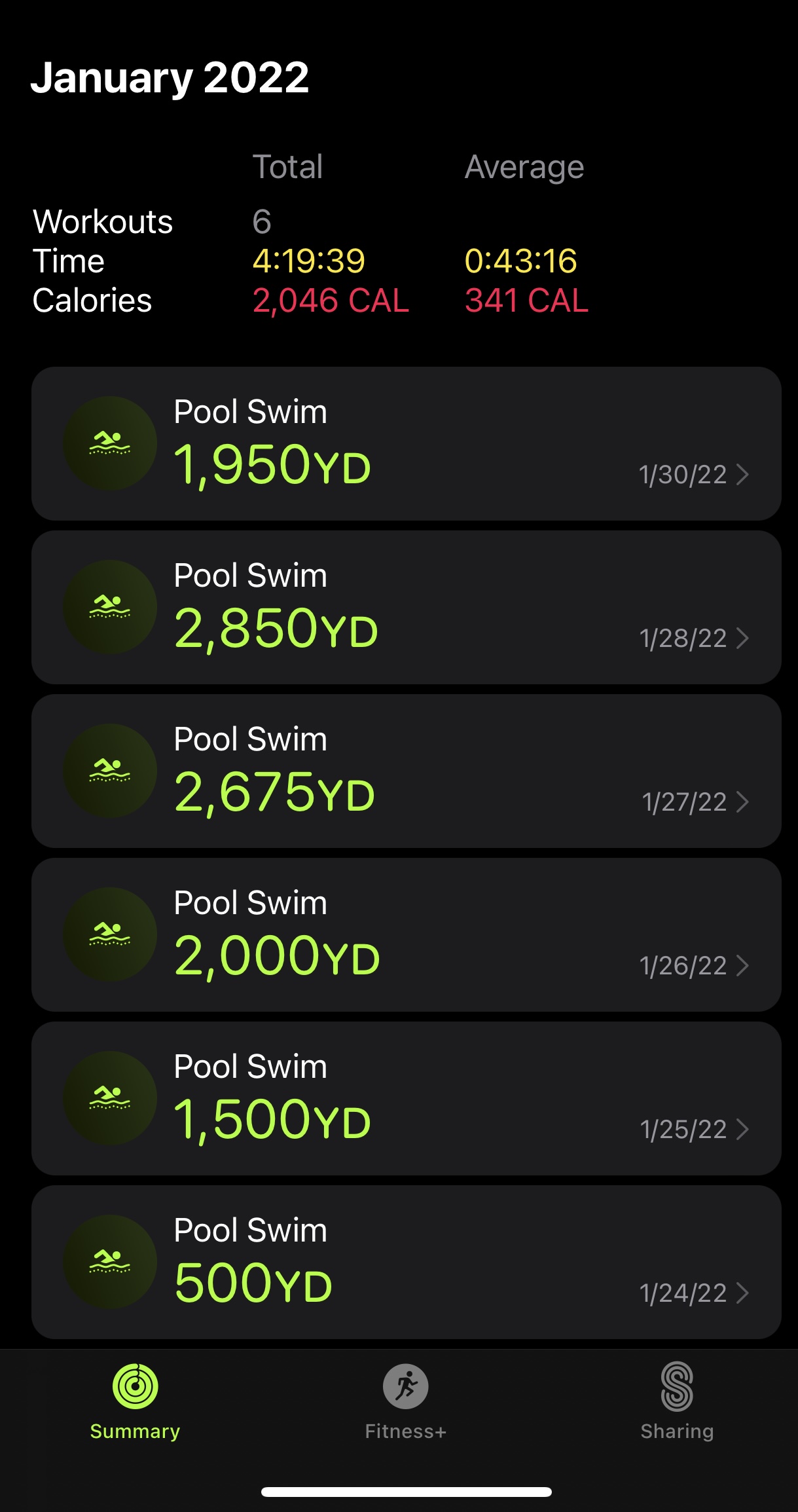
Those were all in one week also, but that’s okay.
Because I swam more in one week than I had in all of the previous year.
That’s a win!
Now I had a monthly baseline.
It was nice and low because I started late in the month.
In February,OKa I swam 10 times.
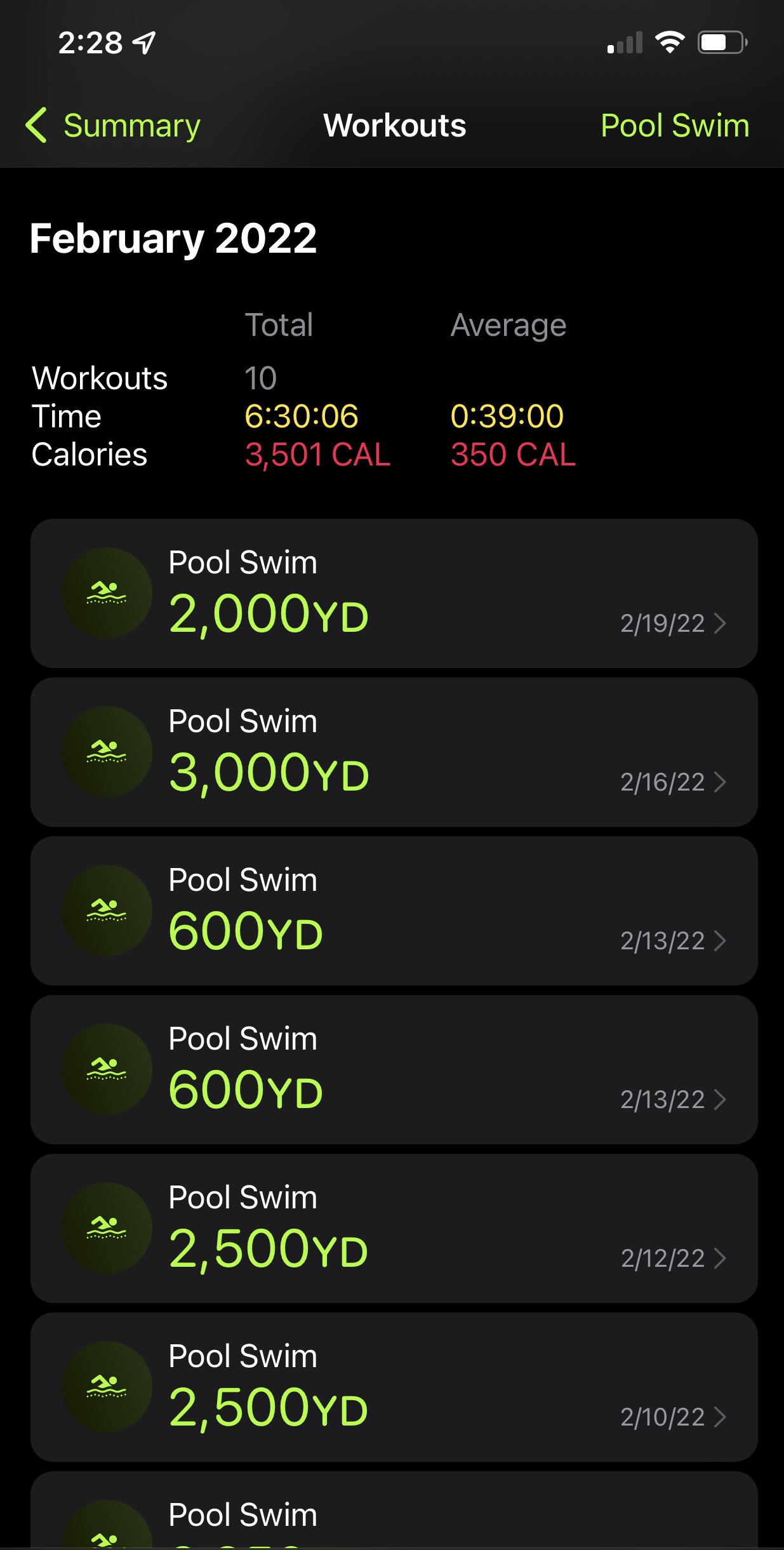
I wanted that total number of swims to be a lot higher, but it was still higher than the month before.
Another win!
In March I’ve only swum 3 times so far.
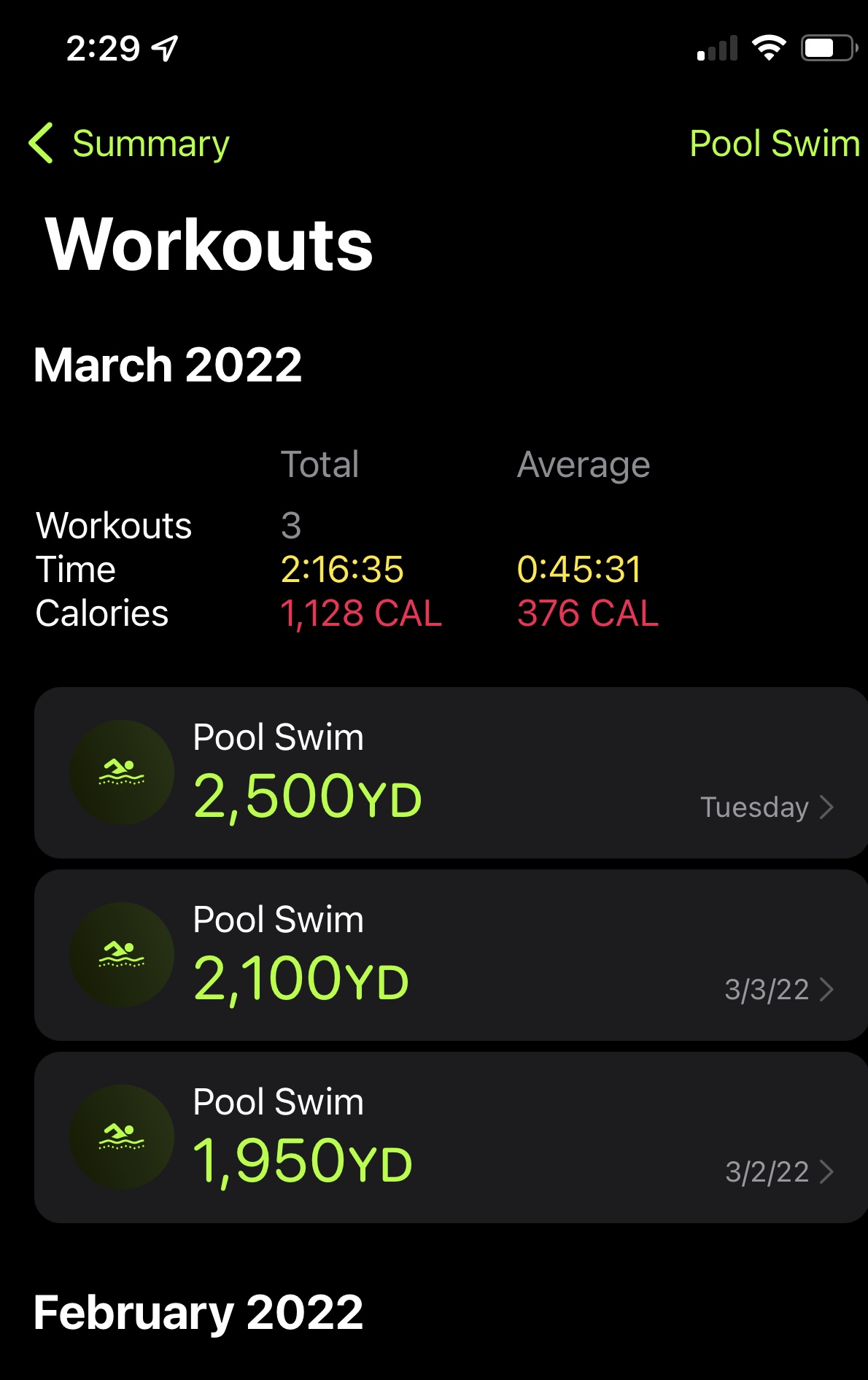
While I ultimately want to be swimming 5 times per week, I feel confident I will swim more than 10 times in March.
That will be an improvement from February and another win.
And I won’t be killing myself to do it.
I won’t be burning myself out, and I won’t feel the need to take a break because I won’t overwhelm myself to begin with.
Focusing on the process rather than the result has eliminated a tremendous amount of stress for me.
Now that I don’t have to go to the pool and I’m not stressing about killing myself to catch up to anyone, you know what’s happened?
I don’t dread swimming anymore.
Ha!
It’s a shift from I have to, to I get to.
I swam with my fifteen-year-old on Monday (she’s home from school on spring break).
Okay I didn’t really swim with her. I swam next to her while she lapped me a hundred times.
But I did swim at the same time as her in the lane next to her.
She got out of the pool a couple minutes before I did and she took a picture of me while I was swimming toward her.
“I wanted to document this. This is going to be such a great day,” she said.
How often do we get to share moments like this with our teenagers?
Not often.
I don’t have to swim.
I get to swim.
Aaaaah…. the power of a mindset shift.


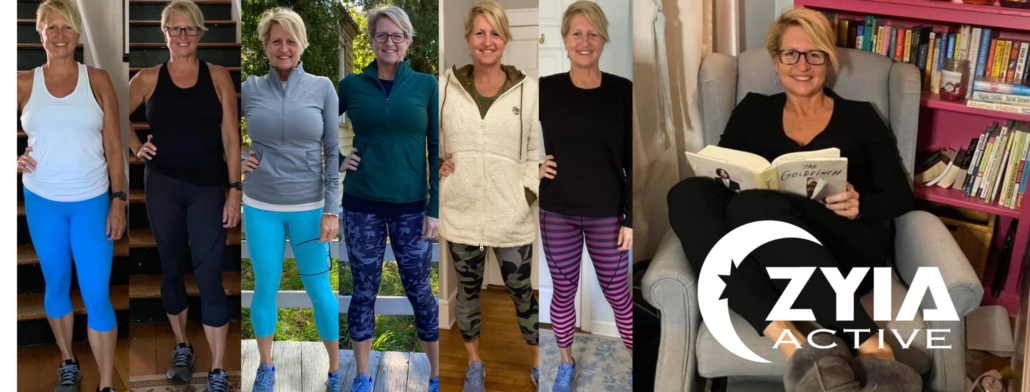
I am happy for you.
As a swimmer who has been nursing a shoulder injury for over a year (thanks February Masters Swimming fitness month), my very first thought was “oh, she’s gonna get injured”. I’m glad you backed off before you did.
Wow, 14,000 yds in one week? I had to divide to see the # of laps, that’s crazy. About 2 months ago I was spinning so much that I spun myself into plantar fasciitis again. When you’re 55, it takes forever for it to go away, and I was hobbling around like an old lady. I had to stop spinning entirely for 2 weeks while stretching and icing. I am having the worst time of my life trying to lose weight after menopause. It is seeming like an impossible task, and I’m at a loss as I’m really trying. Before I had to just cut out one snack a day and weight came off.